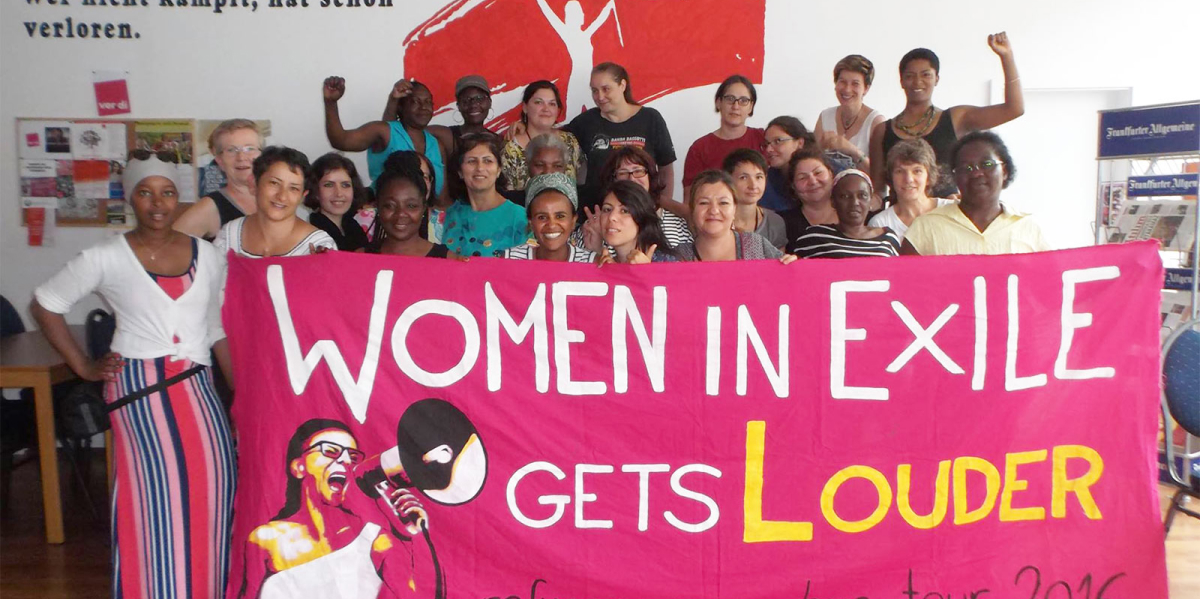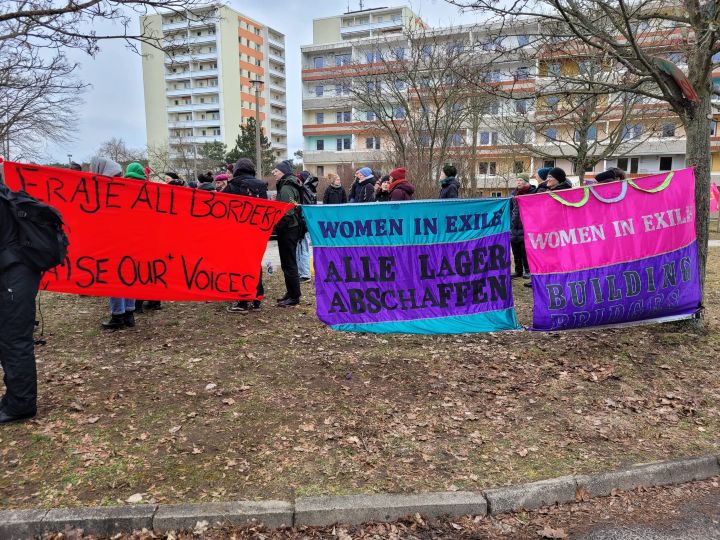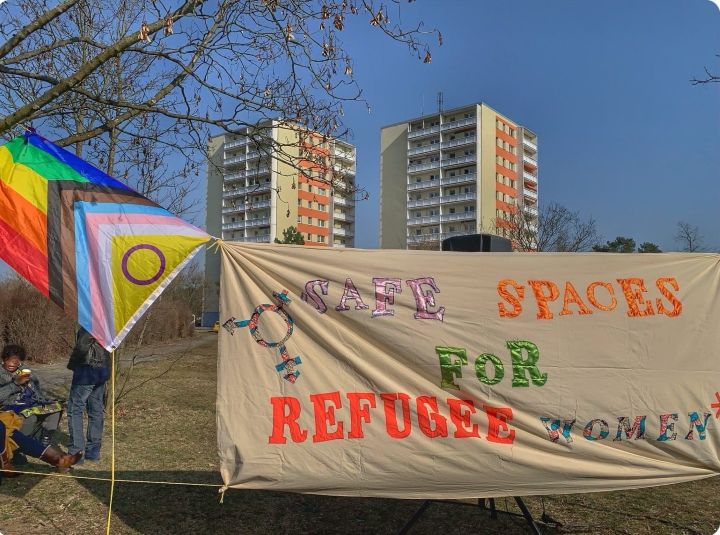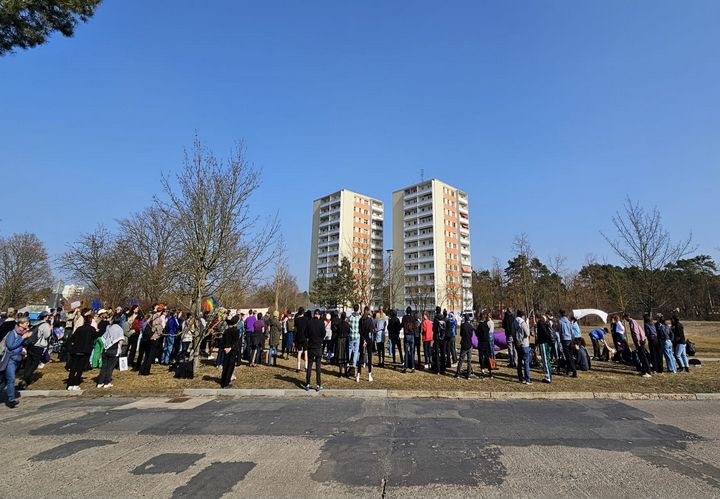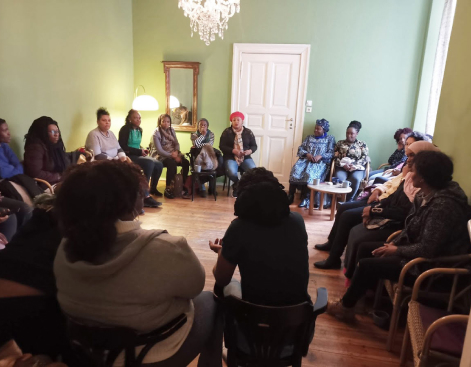Excerpt from pages 192–194 of our book “Breaking Borders to Build Bridges” available through Edition Assemblage
Refugees […] represent the vanguard of their peoples. (Hannah Arendt, 1943)
We’re here because you were there. (Slogan from Oranienplatz, 2012)
Women* who have fled regions of the world devastated by war, colonialism and capitalism are stranded here in a world that has too much of everything, that wants to protect its wealth at all costs, where time rushes past, nobody has time, and everything changes at a breakneck pace.
These women* are brave lone wolves. Often they embarked on the difficult journey alone, in search of a life in dignity for themselves and their children. It has always been like this and still applies today: it is always the strongest who have the courage to venture into the unknown, leave their previous world and search for a future. The very road is debasing. And at every step along the way, men try to rob these women* of their dignity or even their lives.
And when they arrive here in Germany, an elaborate system of isolation in remote Lagers awaits them, which again aims to rob them of their strength and dignity.
Racism simply denies their dignity.
REMEMBER THIS:
Exile isolates people by cutting them off from their previous experience and social contexts and thus sapping their strength.
Lagers make the refugees invisible to the people living here, and vice versa: the refugees are not meant to have real contact with society here.
At Women in Exile they find other women* who have gone the same road and with whom they can speak about their experiences and look for ways to keep up their courage in the face of adversity, so as to overcome invisibility and isolation, and together to shout: “We will get loud” – one of the central slogans of Women in Exile at their demos.
The self-organization of refugee women* is a huge human, social and political challenge. Few of the refugee women* were politically organized before coming to Germany. It is the conditions here – the Lagers and the isolation – that unite them to fight together in an organization like Women in Exile.
Refugees need human and material assistance, and they need more. Solidarity also means sharing knowledge – knowledge of this world here, so that orientation is possible as to where they are living and struggling. Knowledge is power and enables empowerment.
In the Global North, people have much greater opportunities for a good life. They have the power to defend those opportunities, and they do. It’s fundamentally a question of power, of having the option to do something or not to do it. There is also a very unequal distribution of power within this country. All refugees learn that when they come here. Only a few scraps of “European values” or democratic rights remain for them.
In the Global South, those scraps are sold as gifts. The degree of cynicism of Western politicians is intolerable. Mrs Merkel opened the borders very briefly (for whatever reason, and we should discuss that) for refugees who got stuck on the Balkan route in Greece and elsewhere. But at the same time she tightened the living conditions and asylum opportunities for those refugees who had made it to Germany, and she also visited African dictators and took them many millions of euros so they could stay in power and close the inner-African borders. This is what they call “tackling the root causes of displacement”. These borders were artificially erected by the colonial powers more than a hundred years ago to carve up regions of Africa as possessions for the European colonial powers, separating families, villages, communities and regions. In the last 50 years, Africa has tried to abolish these borders and make free movement of people between the individual countries possible again – “like in the EU”. But the EU buys African dictators in order to intercept refugees on the routes to Europe, to close the borders in Africa again. Because of this, people die every day at the borders and en route – in the desert, in the Mediterranean.
The repercussions of this policy are that the borders within the EU are being raised again piecemeal. Those who make it to the heart of imperialism find themselves confronted with a world that is difficult to see through. The sheer scale of consumption is dazzling. What it is made of is obscured. Lithium for mobile phones and batteries comes from Latin America, other minerals or wood come from Africa and other continents, and whole regions are rendered uninhabitable by their extraction. You can’t tell by looking at a smartphone what destruction it has left behind. Everyone is blinded, but the refugees come because their opportunities in life have been destroyed. “We’re here because you were there,” the Oranienplatz refugees shouted. What is meant to remain invisible is revealed for a brief moment in the existence of the refugees. You have to search and look to recognize the causes and connections.
If we don’t want to settle with things the way they are, it’s good to know where you come from and where you’re going. It’s important not to forget your own story and at the same time to learn that of others. A central instrument of power – anywhere – is to make people forget. In the Global North, including here in Germany, the crimes that are meant be forgotten are particularly great and the techniques for making people forget are highly developed. Rulers want to make resistance a thing of the past.
But we know:
People have been struggling against colonialism for 500 years.
The examples of courage, struggle and solidarity give us the courage to fight.
And you can’t fight alone. The women* of Women in Exile provide us a living example.
